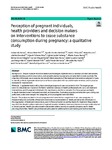Perception of pregnant individuals, health providers and decision makers on interventions to cease substance consumption during pregnancy: a qualitative study

View/
Use this link to cite
http://hdl.handle.net/2183/41195
Except where otherwise noted, this item's license is described as Creative Commons Attribution 4.0 International License (CC-BY 4.0)
Collections
Metadata
Show full item recordTitle
Perception of pregnant individuals, health providers and decision makers on interventions to cease substance consumption during pregnancy: a qualitative studyAuthor(s)
Date
2024-04-09Citation
Vila-Farinas A, Pérez-Ríos M, Montes-Martínez A, Ahluwalia JS, Mourino N, Rey-Brandariz J, Triñanes-Pego Y, Candal-Pedreira C, Ruano-Ravina A, Gómez-Salgado P, Miguez-Varela C, Tajes-Alonso M, Loureiro-Fuentes I, Riesgo-Martín J, Valverde-Trillo A, Fernández-Lema I, Rey-Arijón M, Freiría-Somoza I, Rodríguez-Pampín M, Varela-Lema L. Perception of pregnant individuals, health providers and decision makers on interventions to cease substance consumption during pregnancy: a qualitative study. BMC Public Health. 2024 Apr 9;24(1):990.
Abstract
[Abstract]
Background: Despite multiple recommendations and strategies implemented at a national and international level, cigarette smoking, alcohol consumption, and cannabis use during pregnancy remains high in most countries. The objective of this study was to examine key stakeholders' perception of the treatment interventions adopted in Spain, to identify political, organizational and personal factors associated with successful implementation, and to propose strategies for improvement.
Methods: A qualitative study with a phenomenological approach was conducted in 2022. The target groups were: (1) clinical decision makers in the field of addiction science, (2) health professionals who carry out treatment interventions, and (3) pregnant individuals who use tobacco, alcohol or cannabis. Two focus groups and eight in-depth interviews were conducted, recorded, and transcribed. Exploratory analysis and inductive open coding was performed, codes were merged into categories, and subcategories were identified.
Results: The analysis resulted in 10 subcategories which were further merged into three main categories: (1) Degree of adoption and utility of treatment interventions implemented; (2) Needs and demands with respect to the organization of treatment interventions; and, (3) Personal barriers to and facilitators for treatment. Respondents reported that despite multiple national and regional cessation initiatives, treatment interventions were rarely adopted in clinical practice. Health care administrators demanded reliable records to quantify substance use for better planning of activities. Health care professionals advocated for additional time and training and both echoed the importance of integrating cessation interventions into routine prenatal care and creating in-house specialized units. The difficulty in quitting, lack of awareness of risk for foetus and child and the controversial advice were identified as barriers by pregnant individuals.
Conclusions: Consistent with previous work, this study found that cessation strategies implemented by the health authorities are not effective if they are not accompanied by organizational and behavioral changes. The current study identifies a set of factors that could be pivotal in ensuring the success of treatment interventions targeting tobacco, alcohol and cannabis use among pregnant individuals.
Keywords
Alcohol consumption
Cannabis
Pregnant individuals
Qualitative research
Smoking cessation
Cannabis
Pregnant individuals
Qualitative research
Smoking cessation
Editor version
Rights
Creative Commons Attribution 4.0 International License (CC-BY 4.0)
ISSN
1471-2458






